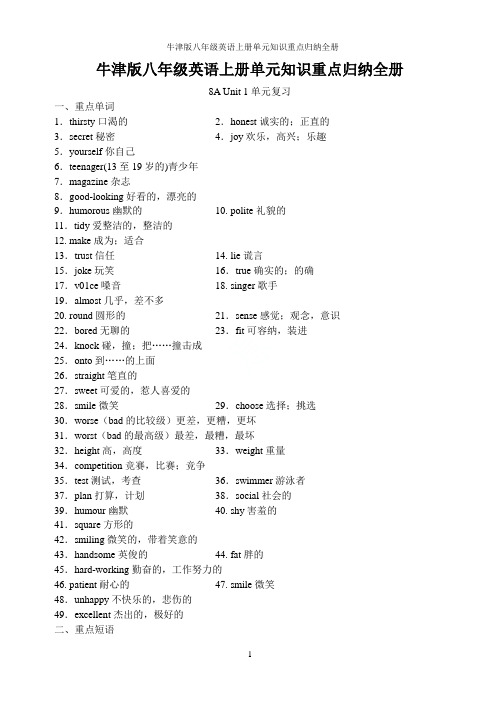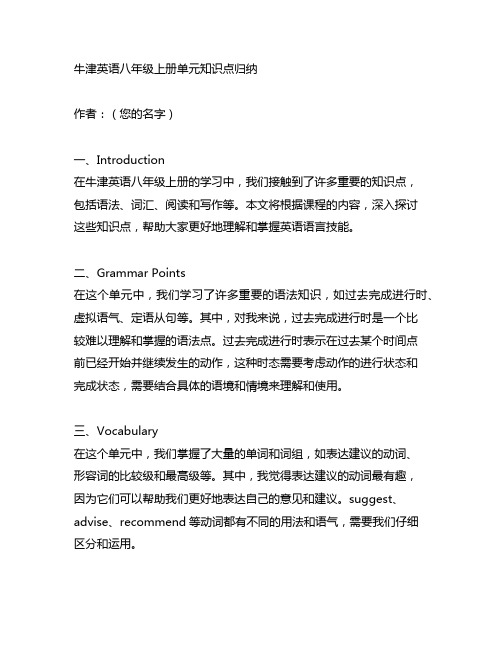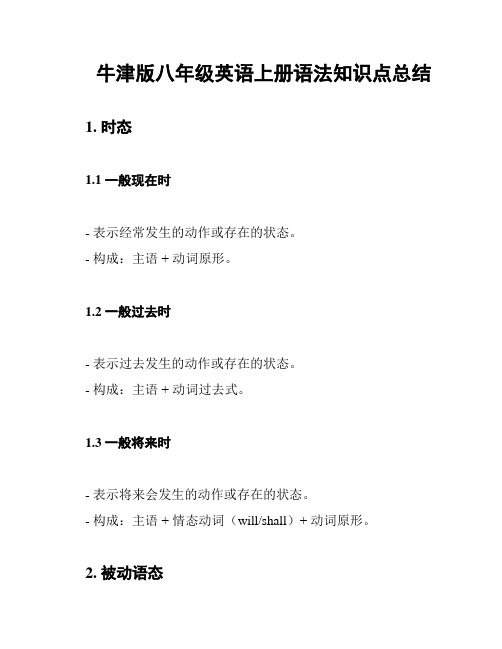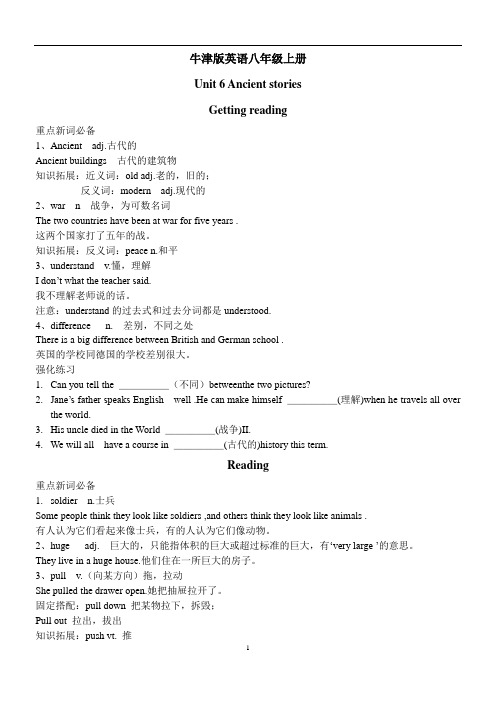牛津英语八年级上册知识点总结
牛津英语八年级上册知识点总结

Chapter 1 Water1.we can’t live without (没有) /with(有)waterHe went away without saying goodbye.2.two litres of water (两升水)/ three cups of coffeefour pieces of paper…3. a little oil (有一点)/ little oil(几乎没有)+ 不可数名词a few books/ few books + 可数名词4.too much + 不可数名词(太多)/ much too (太)+形容词too many + 可数名词(太多)5.boiling water (正在沸腾的水)& boiled water (开水)relaxing (令人放松的)& relaxed(人)感到放松的6.cover A with B 用B盖住A / be covered with 被。
覆盖7.one third (三分之一)/ two thirds(三分之二)子基母序,分子超过一,分母加s8.half of… 。
的一半(主语看后面名词)9.flow into / run into 流入。
10.t he sun rises in the east太阳从东方升起/ raise your hand 举手11.f rom A to B 从A到B12.b rush one’s teeth 刷牙13.l eave … on 让。
处于开着的状态14.p our into 倒入15.t urn on/ off = switch on/off 打开/ 关掉turn up 调大/ turn down 调小16.v oice 人的声音/ noise 噪音/ sound 声音17.l ook around 环视周围18.w aste time (in)doing sth / on sth 浪费时刻做某事19.s ound angry ---- look/ smell / taste / sound / feel + 形容词(比较级)be / become/ go/ get/ turn/ keep/ make +形容词(比较级)much / even / far / any / a little / a bit/ no/ still + 比较级20.i t’s easy for you to do sth 做。
八年级上册英语牛津版笔记

八年级上册英语牛津版笔记以下是八年级上册牛津版英语的学习笔记:Unit 1:现在和过去1. 现在进行时(Present Continuous Tense):表示正在进行的动作或正在发生的情境。
结构为“be动词+动词-ing”。
例如:I am studying English。
2. 现在完成时(Present Perfect Tense):表示已经完成的动作或已经发生的情境。
结构为“have/has+过去分词”。
例如:I have studied English for two years。
3. 一般过去时(Simple Past Tense):表示过去某个时间点的动作或情境。
结构为“动词的过去式”。
例如:I studied English last year。
4. 过去进行时(Past Continuous Tense):表示过去某个时间点正在进行的动作。
结构为“was/were+动词-ing”。
例如:I was studying English at 10 o’clock yesterday。
5. 过去完成时(Past Perfect Tense):表示在过去某个时间点之前已经完成的动作。
结构为“had+过去分词”。
例如:I had studied English before I came to the UK。
Unit 2:频率和频率副词1. 频率副词(Frequency Adverbs):表示动作发生的频率,如always、usually、often、sometimes、never等。
2. 表示频率的句型:“How often do you/does sb. do sth.?”例如:“How often do you go to the cinema?”3. 表示频率的单词和短语:once a week、twice a month、three times a year等。
Unit 3:将来时间1. 一般将来时(Simple Future Tense):表示将来某个时间点将要发生的动作或情境。
牛津上海版英语八上各单元知识点

牛津上海版英语八上各单元知识点Unit 1: Hobbies and Sports- Vocabulary related to hobbies and sports- Expressing likes and dislikes- Present simple tense for routines and habits- Question words (what, who, where) to ask about hobbies- Expressing opinions and reasonsUnit 2: Home and Family- Vocabulary related to home and family- Describing family members and their appearance- Possessive adjectives (my, your, his, her) to talk about family members- Present continuous tense for actions happening now- Prepositions of place (in, on, under, behind, in front of) to describe location- Talking about daily routines and activities at homeUnit 3: School Life- Vocabulary related to school subjects and activities- Talking about school routines and rules- Expressing preferences and abilities- Present continuous tense for future arrangements- Question words (when, why) to ask about school activities Unit 4: Festivals and Traditions- Vocabulary related to festivals and traditions- Talking about celebrations and customs- Present simple tense for facts and general truths- Describing events using adjectives and adverbs- Expressing opinions about festivals and traditions- Question words (what, how) to ask about festivals and traditionsUnit 5: Health and Fitness- Vocabulary related to health and fitness- Describing illness and symptoms- Talking about healthy habits and lifestyle- Present continuous tense for future plans- Giving advice and suggestions- Imperatives to give instructions for exercises and activitiesUnit 6: Travel and Adventure- Vocabulary related to travel and adventure- Describing travel destinations and activities- Using there is/are to talk about places- Talking about past experiences using past simple tense- Question words (who, where) to ask about travel experiences- Expressing preferences and reasons for travel destinations Unit 7: Festivals and Celebrations- Vocabulary related to festivals and celebrations- Talking about traditions and customs- Present perfect tense to talk about past experiences- Talking about personal experiences using adverbs- Grouping words into categories (like, dislike, love, hate) - Giving reasons and explanations for opinionsUnit 8: Heroes and Icons- Vocabulary related to heroes and icons- Describing famous people and their achievements- Present perfect tense to talk about life experiences- Talking about qualities and characteristics of heroes - Expressing admiration and opinions。
最全面牛津版八年级上册英语各单元知识点总复习归纳总结

最全面牛津版八年级上册英语各单元知识点总复习归纳总结1. Unit 1: Greetings and Introductions- Present simple tense- Questions with "what" and "where"2. Unit 2: School Life- Describing school subjects- Using adjectives to describe teachers and classmates- Asking and answering questions about school routines3. Unit 3: Hobbies- Vocabulary related to hobbies and interests- Expressing likes and dislikes- Present continuous tense4. Unit 4: Food and Health- Food vocabulary and describing preferences- Expressing opinions on healthy eating habits- Imperative sentences for giving suggestions and instructions5. Unit 5: Holidays and Traditions- Vocabulary related to holidays and celebrations- Describing past events- Using time expressions and prepositions to talk about when and where6. Unit 6: Environment- Vocabulary related to environmental issues- Expressing concerns and suggestions for protecting the environment- Present perfect tense to talk about experiences7. Unit 7: Jobs and Career Choices- Vocabulary related to different professions- Talking about future plans and aspirations- Using "will" and "going to" for future predictions and intentions- Expressing opinions on advantages and disadvantages of technology- Present perfect continuous tense这份文档总结了八年级上册牛津版英语教材各单元的知识点。
(完整版)译林牛津英语8上英语知识点(新)

八年级上册英语知识点归纳第一单元:Friends1 three passages about friends 关于朋友的 3 篇文章2 to use the new words to describe my friends 用生词描述我的朋友3 to use comparative and superlative adjectives 使用形容词的比较级和最高级4 to use a vocabulary tree to remember new words 用词?匚树来认生词重点知识回顾一【重点单词】thirsty 口渴的 care 关心,在意 good-looking 好看的 tidy 爱整洁的,整洁的 lie 谎百any time 在任何时候 almost 几乎,差不多 bored 无聊的 straight 笔直的 choose 选择,挑选worst (bad 的最高级)weight 重量 swimmer 游泳者 shy 害羞的 patient 耐心的 二【重点短语】honest 诚实的;正直的 yourself 你自己 humorous 幽默的 make 成为;适合 joke 玩笑 voice 嗓音 round 圆形的 fit 可容纳,装进 sweet 可爱的,惹人喜爱的secret 秘密magazine 杂志 polite 礼貌的 trust 信任true 确实的,的确 singer 歌手sense 感觉,观念 knock碰,撞 smile 微笑 social 社会的handsome 英俊的 excellent 杰出,极好的1 something to drink 一些喝的东西2 have some more food 再吃点儿食物3 one of my best friends 我最好的朋友之——4 be willing to share things with her friends 愿意和她的朋友分享东西5 help me with my homework 帮助我做家庭作业6 give her seat on the bus to someone in need 在公共汽车上把她的座位让给有需 要的人7 grow up 长大,成长worse (bad 的比较级)更差,更坏,更糟糕height 高,高度test 测试,考查最差,最糟,最坏competition 竞赛,比赛plan 打算,计戈Usmiling 微笑的unhappy 不快乐的;悲伤的8make sb. look smart是某人看上去聪明9have a good sense of humou枸彳艮强的幽默感10tell funny jokes讲有趣的笑话11walk past our desks经过我们的课桌12knock…onto… 把...... 撞至U ... 上13say a bad word about sb讲某人的坏话14keep a secret 保守秘密15travel around the world 环游世界16both my neighbour and my best friend17feel bored or unhappy感到无聊或不快乐三【重点句型】1There s nothing in the fridge.冰箱里没有东西2He tells funny jokes and always makes me laugh.他讲滑稽的笑话而且总是使我大笑。
牛津八年级上学期英语语法总结

牛津八年级上学期英语语法总结本文档是针对牛津八年级上学期英语语法的总结,内容如下:一、词性英语词汇主要分为以下几种词性:1. 名词:表示人、事物、地点、抽象概念等;2. 代词:用于代替名词,如 he、she、it 等;3. 动词:表示动作、状态或现象,如 run、jump、sing 等;4. 形容词:描述名词或代词的性质、状态、特征等,如beautiful、tall、happy 等;5. 副词:用于修饰动词、形容词或其他副词,如 slowly、loudly 等;6. 介词:用于介绍名词或代词与其他词之间的关系,如 in、on、at 等;7. 连词:用于连接单词、短语或句子,如 and、but、or 等;8. 冠词:用于修饰名词,分为不定冠词(a/an)和定冠词(the)。
二、句型英语语法中常用的句型有以下几种:1. 简单句:只包含一个主语和一个谓语的句子,如 The cat is black.;2. 复合句:包含一个主句和一个或多个从句的句子,如 I will go to the park if it is sunny.;3. 并列句:包含两个或多个并列的主句的句子,如 I like football and she likes basketball.;4. 疑问句:用于询问事实、情况或信息的句子,如 Do you like pizza?;5. 否定句:表示否定的句子,如 I don't like chocolate.;6. 祈使句:用于发出请求、命令或建议的句子,如 Go to bed now.三、时态英语中表示时间的方式称为时态,主要分为以下几种:1. 一般现在时:表示现在正在发生的事情,如 We often drink tea in the afternoon.;2. 现在进行时:表示现在正在进行的动作,如 She is watching TV now.;3. 一般过去时:表示过去发生的事情,如 He went to the park yesterday.;4. 过去进行时:表示过去某个时间正在进行的动作,如 I was studying English yesterday at this time.;5. 现在完成时:表示过去某个时间开始到现在的动作或状态,如 I have been to America three times.;6. 将来时:表示将来要发生的事情,如 I will go to school tomorrow.。
牛津版英语八年级上册知识点总结

八年级知识总结(上册)M o d u l e1:My l i f eU1:P e n f r i e n d sU2:W o r k a n d p l a yU3:T r o u b l eM o d u l e2:Am a z i n g t h i n g sU4:N u m b e r sU5:E n c y c l o p a e d i aM o d u l e3:Se c t i o n f i c t i o nU6:N o b o d y w i n sU7:N o b o d y w i n sⅠWords:1.penfriend 笔友 pen pal2.magazine 杂志 a literary magazine 文学杂志 women’s magazine 妇女杂志→n. magazinist 期刊编辑3.hobby 业余爱好4.chess 国际象棋 chessman 棋子(pl. chessmen) chessboard 棋盘5.own 拥有 own up 承认错误 owner 所有者物主业主6.good/well—better---best7.architect 建筑师 architecture 建筑学8.nearby adv. 在附近不远 adj. 附近的邻近的9.keen adj. 热心的渴望的敏锐的灵敏的 Keenly adv.敏锐地 keennessn. 敏锐10.ambition 雄心抱负 be full of ambition 野心勃勃 ambitious adj.有雄心的11.enclose 附上Ⅱ Phrases1.at the end 在………的末端2.be keen on 热心于做热衷于………3.play chess 下象棋4.twelve years old5.a boy called Tom 一个名叫Tom 的男孩 a boy named Tom a boy with thename Tom6.best wishes 最好的祝愿7.by +交通工具 = take +a/an +交通工具8.tell sb. about sth. 告诉某人关于某事 tell sb. to do sth. 告诉某人做某事 tell sb. not to do sth. 告诉某人别做某事9.enjoy doing sth. 喜欢做某事 like doing sth.mind /practice/finish/10.speak /tell /say/talksay 说述说 speak 说话发言电话来时用speaking talk 说谈话of/about tell 告诉讲述Ⅲ Sentence1.make it +adj. for sb. to do sth. it 形式宾语2.sth. +be+ to do 动词不定式做表语3.I hope you will write to me soon . 我希望你尽快给我回信hope 有可能实现的愿望 wish 不大可能实现的愿望hope to do 希望做某事 wish sb. to do 希望某人做……..Ⅳ GrammarⅠquestion words (疑问词)what、who(whom) / whose/which/when/where/how/whyhow many/much/long/far/soon/fast/often/ how many timesⅡ冠词1.不定冠词a/an的用法“不见“原因”(发元音)别施“恩”(an)特殊案例:前需要加a 的:university a usual book Europe 欧洲European欧洲人one-day trip需要加an 的: unhappy + n. uncle unusual + n.2. 定冠词the的用法特指双方熟悉,上文已经提起。
牛津英语八年级英语上知识点

8A Unit 1 Friends1. PassageKate is both my best friend and my neighbour. She lives next door. I got to know her ten years ago. Kate is tall and slim. She has square face and a long nose. I like her bright, smiling eyes. They make her look really pretty and kind. She has long hair.Kate is a very clever girl and she likes to help people. She always helps me with my homework. When I feel bored or happy, she talks to me and tells me funny jokes. She always wears a smile on her face and looks happy.2. Word and phrase1)have sth. to drink喝点东西have sth. to eat吃点东西例:If you are thirsty, have something to drink.如果你渴了,就喝点什么吧。
Do you want to have something to drink now你现在想吃点东西吗/2)make sb.+adj. 表示使某人(怎样)make sb. special:使某人特别例:This song makes him really sad.这首歌使他很悲伤He can always make me happy.他总能让我高兴。
3)get to do sth. 有机会做某事例:Betty and I may not get to see each other often but we will always be best friends.贝蒂和我也学没有机会经常见面,但我们将永远是最好的朋友。
牛津版八年级英语上册单元知识重点归纳全册

牛津版八年级英语上册单元知识重点归纳全册8A Unit 1单元复习一、重点单词1.thirsty口渴的2.honest诚实的;正直的3.secret秘密4.joy欢乐,高兴;乐趣5.yourself你自己6.teenager(13至19岁的)青少年7.magazine杂志8.good-looking好看的,漂亮的9.humorous幽默的10. polite礼貌的11.tidy爱整洁的,整洁的12. make成为;适合13.trust信任14. lie谎言15.joke玩笑16.true确实的;的确17.v01ce嗓音18. singer歌手19.almost几乎,差不多20. round圆形的21.sense感觉;观念,意识22.bored无聊的23.fit可容纳,装进24.knock碰,撞;把……撞击成25.onto到……的上面26.straight笔直的27.sweet可爱的,惹人喜爱的28.smile微笑29.choose选择;挑选30.worse(bad的比较级)更差,更糟,更坏31.worst(bad的最高级)最差,最糟,最坏32.height高,高度33.weight重量34.competition竞赛,比赛;竞争35.test测试,考查36.swimmer游泳者37.plan打算,计划38.social社会的39.humour幽默40. shy害羞的41.square方形的42.smiling微笑的,带着笑意的43.handsome英俊的44. fat胖的45.hard-working勤奋的,工作努力的46. patient耐心的47. smile微笑48.unhappy不快乐的,悲伤的49.excellent杰出的,极好的二、重点短语1.something to drink 一些喝的东西2.have some more food 再吃一些食物3.keep a secret保守秘密4.make me happy使我开心5.have problems有问题6.care about关心,关怀7.tell lies撒谎,说谎8.one of my best friends我最好的朋友之一9.be willing to do愿意做10.share things with sb.与某人分享东西11.any time(一anytime)在任何时候12.give her seat on the bus在公共汽车上让出她的座位13.someone in need某个需要帮助的人14.grow up长大,成人15.make him look smart使他看起来神气16.walk past经过,路过17.knock sth. onto把某物撞落在……上18.say a bad word about sb.说某人的坏话19.in the future在未来20. help people with their problems帮助人们解决问题21.social worker社会工作者22.works of art艺术品23. some day某一天24.smiling eyes笑眯眯的眼睛25.make an excellent teacher成为一名优秀的教师三、重点句子及点拨1.Can I have something to drink?我可以喝点东西吗?something to drink意为“一些喝的东西”,其中动词不定式to drink作后置定语,修饰不定代词something。
八年级上册英语知识点牛津

八年级上册英语知识点牛津在八年级上册英语学习中,牛津课程中的知识点掌握是至关重要的。
以下是本学期需要掌握的重要内容:一、词汇词汇是语言的基础,也是学好英语的重要组成部分。
因此,在八年级上册,我们需要学习大量的单词,包括动词、名词、形容词、副词等。
另外,我们需要掌握的重要词汇还包括常用短语、惯用语、俚语和成语等,并学习它们的正确使用方法。
二、语法语法是英语学习的核心部分,也是写作和口语表达的关键。
在本学期的牛津课程中,我们将学习以下重要语法知识:1. 过去时和过去分词2. 现在完成时3. 其他时态4. 主动语态和被动语态5. 祈使句、感叹句和疑问句6. 名词、形容词和副词的比较级和最高级三、听力八年级上册牛津课程的听力训练是非常重要的,我们需要通过听力听懂并理解教师或教材中用英语表述的句子或段落。
为了提高学生的听力技能,牛津课程为我们提供了大量的听力训练。
四、阅读阅读是英语学习的重要环节,它可以提高我们的阅读理解能力和语言水平。
在牛津课程中,我们需要阅读各种文本形式,包括新闻报道、短文、小说等,并进行相关练习。
五、口语和写作口语和写作是英语学习的重点,因为它们是语言实践的两个方面,对于我们来说是必不可少的。
我们需要通过课堂和课外活动提高口语表达和写作能力。
在本学期的牛津课程中,我们将学习如何正确表达想法、描述事物和人物,以及如何编写日记、文章和信件等不同形式的写作。
总而言之,八年级上学期的牛津课程对于我们的英语学习至关重要,我们需要通过认真学习、刻苦实践以及不断提高自己的语言水平,才能在英语学习中重要地步骤上取得成功。
八年级上册英语知识点汇总(牛津版)

八年级上册英语知识点汇总(牛津版)Grammar- Present simple tense: Used to talk about habitual actions, general truths, and routines.- Present continuous tense: Used to talk about actions happening at the moment of speaking or temporary situations.- Past continuous tense: Used to talk about actions that were happening at a specific time in the past.- Future simple tense: Used to talk about future actions.- Modal verbs: Used to express ability, permission, possibility, necessity, etc.- Reported speech: Used to report what someone said in the past.- Conditional sentences: Used to talk about hypothetical situations and their consequences.Vocabulary- Family: Words related to family members, such as mother, father, sister, brother, etc.- School subjects: Words related to subjects taught in school, such as mathematics, science, English, etc.- Hobbies: Words related to activities people do for enjoyment, such as swimming, playing music, reading, etc.- Daily routine: Words related to everyday activities, such as wake up, brush teeth, have breakfast, etc.- Travel: Words related to traveling, such as airport, hotel, ticket, etc.- Jobs: Words related to different occupations, such as doctor, teacher, engineer, etc.- Food: Words related to different types of food, such as fruits, vegetables, meat, etc.Reading- Vocabulary in context: Understanding the meaning of words in a given passage based on the context.- Inference: Drawing conclusions or making assumptions based on the information provided in a passage.Writing- Sentence structure: Writing grammatically correct sentences with proper subject-verb agreement, tense usage, etc.- Paragraph development: Organizing ideas logically and coherently in a paragraph.- Descriptive writing: Using adjectives, adverbs, and sensory details to describe a person, place, or thing.- Narrative writing: Writing a story with a clear beginning, middle, and end.- Opinion writing: Expressing personal opinions and supporting them with reasons and examples.Listening- Understanding conversations: Understanding dialogues between two or more speakers.- Note-taking: Writing down important information while listening.Speaking- Pronunciation: Speaking words and sentences clearly and accurately.- Expressing opinions: Expressing personal opinions and providing reasons or examples to support them.- Asking and answering questions: Asking and answering questions in a conversation.Study Skills- Vocabulary learning strategies: Using various techniques to learn and remember new vocabulary words.- Note-taking techniques: Developing effective note-taking methods during lessons or while reading.- Time management: Planning and organizing study time effectively.- Test preparation: Developing strategies to prepare for quizzes and exams.Cultural Knowledge- Cultural practices: Understanding different customs and traditions in English-speaking countries.- Festivals and celebrations: Learning about important holidays and celebrations in English-speaking countries.- Geography: Learning about the geography of English-speaking countries.Translation Skills- Translating sentences and paragraphs from Chinese to English and vice versa.These are the key knowledge points covered in the Oxford version of the 8th grade English textbook. By mastering these topics, students will have a solid foundation in English language skills.。
牛津英语八年级上册单元知识点归纳

牛津英语八年级上册单元知识点归纳作者:(您的名字)一、Introduction在牛津英语八年级上册的学习中,我们接触到了许多重要的知识点,包括语法、词汇、阅读和写作等。
本文将根据课程的内容,深入探讨这些知识点,帮助大家更好地理解和掌握英语语言技能。
二、Grammar Points在这个单元中,我们学习了许多重要的语法知识,如过去完成进行时、虚拟语气、定语从句等。
其中,对我来说,过去完成进行时是一个比较难以理解和掌握的语法点。
过去完成进行时表示在过去某个时间点前已经开始并继续发生的动作,这种时态需要考虑动作的进行状态和完成状态,需要结合具体的语境和情境来理解和使用。
三、Vocabulary在这个单元中,我们掌握了大量的单词和词组,如表达建议的动词、形容词的比较级和最高级等。
其中,我觉得表达建议的动词最有趣,因为它们可以帮助我们更好地表达自己的意见和建议。
suggest、advise、recommend等动词都有不同的用法和语气,需要我们仔细区分和运用。
四、Reading Comprehension阅读理解是英语学习中非常重要的一部分,通过阅读能够扩大我们的词汇量和语言表达能力。
在本单元中,我们接触了一些有趣的阅读材料,包括新闻报道、小说片段等。
其中,我印象最深刻的是一篇关于环保的文章,它提醒我们应该如何保护环境,守护地球,这让我深刻理解到环保问题的重要性。
五、Writing Skills写作是提高英语能力的重要途径之一,通过写作能够更好地表达自己的想法和观点。
在这个单元中,我们学习了如何写议论文、书信等不同类型的作文。
我觉得写议论文是一个挑战,因为需要我们清晰地表达自己的观点,同时能够提出有说服力的论据和证据。
六、Conclusion通过本单元的学习,我对这些重要的知识点有了更深入的理解和掌握。
通过不断的练习和实践,相信我在英语学习中会取得更好的成绩。
我也意识到学习英语不仅仅是学习语法和词汇,更重要的是要理解和运用语言背后的文化和思维方式。
牛津版八年级英语上册语法知识点总结

牛津版八年级英语上册语法知识点总结1. 时态1.1 一般现在时- 表示经常发生的动作或存在的状态。
- 构成:主语 + 动词原形。
1.2 一般过去时- 表示过去发生的动作或存在的状态。
- 构成:主语 + 动词过去式。
1.3 一般将来时- 表示将来会发生的动作或存在的状态。
- 构成:主语 + 情态动词(will/shall)+ 动词原形。
2. 被动语态2.1 被动语态的构成- 一般现在时:主语 + am/is/are + 过去分词。
- 一般过去时:主语 + was/were + 过去分词。
- 一般将来时:主语 + will be + 过去分词。
2.2 被动语态的用法- 强调动作的承受者。
- 表示动作的执行者不重要或未知。
3. 情态动词3.1 情态动词的用法- can表示能力或可能性。
- may表示请求或允许。
- must表示肯定推测或强制。
- should表示应该或建议。
- shall表示承诺或警告。
- will表示意愿或将来时。
3.2 情态动词的辨析- can和may表示可能性,但can表示能力时不能用may替换。
- must表示肯定推测时,后句用否定形式;表示强制时,后句用肯定形式。
- shall和will表示意愿,但shall用于第一人称,will用于第三人称。
4. 句子结构4.1 简单句- 包含一个主语和一个谓语。
- 例如:The cat sleeps.4.2 并列句- 包含两个或多个主语和谓语,用并列连词连接。
- 例如:The cat sleeps, and the dog barks.4.3 复合句- 包含一个主句和一个或多个从句。
- 例如:The cat sleeps when the sun sets.4.4 复杂句- 包含一个主句和两个或多个从句。
- 例如:The cat sleeps when the sun sets, and the dog barks at night.5. 疑问句5.1 一般疑问句- 采用倒装结构,将助动词或情态动词移至主语前。
牛津版英语八年级上册Unit-6知识点归纳总结

牛津版英语八年级上册Unit 6 Ancient storiesGetting reading重点新词必备1、Ancient adj.古代的Ancient buildings 古代的建筑物知识拓展:近义词:old adj.老的,旧的;反义词:modern adj.现代的2、war n 战争,为可数名词The two countries have been at war for five years .这两个国家打了五年的战。
知识拓展:反义词:peace n.和平3、understand v.懂,理解I don’t what the teacher said.我不理解老师说的话。
注意:understand的过去式和过去分词都是understood.4、difference n. 差别,不同之处There is a big difference between British and German school .英国的学校同德国的学校差别很大。
强化练习1.Can you tell the _____(不同)betweenthe two pictures?2.Jane’s father speaks English well .He can make himself _____(理解)when he travels all overthe world.3.His uncle died in the World _____(战争)II.4.We will all have a course in _____(古代的)history this term.Reading重点新词必备1.soldier n.士兵Some people think they look like soldiers ,and others think they look like animals .有人认为它们看起来像士兵,有的人认为它们像动物。
牛津版八年级上册知识点

牛津版八年级上册知识点一、不定代词概说英语的不定代词有all, each, both, either, neither, one, none, little, few, many, much, other, another, some, any, no, (a) few, (a) little, both, enough, every 等,以及由some, any, no 和every 构成的合成代词(即somebody, anyone, nothing 等)。
在这些不定代词中,多数都能作主语、宾语、表语或定语,但是代词none 以及由some, any, no 和every 构成的合成代词只能作主语、宾语或表语,不能作定语,而no 和every 则只用作定语二、指两者和三者的不定代词有些不定代词用于指两者(如both, either, neither),有的不定代词用于指三者(如all, any, none, every),注意不要弄混:Both of my parents are doctors. 我的父母都是医生。
All of the students are interested in it. 所有的学生对此都很感兴趣。
There are trees on any side of the square. 广场的每一边都种有树。
He has two sons, neither of whom is rich. 他有两个儿子,都不富有。
He has three sons, none of whom is rich. 他有三个儿子,都不富有。
【说明】each 可用于两者、三者或三者以上,而every 只用于三者或三者以上,因此用于两者时只能用each,不能用every。
如不能说There are trees on every side of the road.三、复合不定代词的用法特点复合不定代词包括something, somebody, someone, anything, anybody, anyone, nothing, nobody, no one, everything, everybody, everyone 等。
牛津8上知识点总结

牛津8上知识点总结在牛津英语8上册中,我们学习了许多英语知识,包括语法、词汇、阅读理解、写作等方面。
下面将对牛津英语8上册的知识点进行总结,希望对同学们的学习有所帮助。
1. 语法知识在牛津英语8上册中,我们学习了许多语法知识,包括名词、动词、形容词、副词、代词、冠词、介词、连词等。
其中,名词的单数和复数形式、不可数名词、名词所有格、专有名词的用法等是比较重要的知识点;动词的变位、时态、语态、情态动词、动词不定式等也需要我们认真掌握;形容词和副词的比较级和最高级、形容词和副词的修饰位置等也是需要我们注意的知识点。
2. 词汇知识在牛津英语8上册中,我们学习了大量的词汇,包括常用单词、短语、固定搭配等。
这些词汇涉及到日常生活、学习、娱乐、社交等方方面面,需要我们通过不断地积累和记忆,才能更好地掌握和运用。
3. 听力训练在学习英语过程中,听力训练是至关重要的一环。
在牛津英语8上册中,我们不仅学习了听力材料中所包含的语法和词汇知识,还锻炼了听力理解和应对听力考试的能力。
通过反复练习,我们可以提高自己的听力水平,更好地理解和运用英语。
4. 阅读理解阅读理解是我们学习英语的一个重要方面。
在牛津英语8上册中,我们学习了不少阅读材料,涉及到各种主题和文体。
通过阅读理解,我们不仅可以巩固和运用所学的语法和词汇知识,还可以提高自己的阅读能力和理解能力,从而更好地掌握和运用英语。
5. 写作能力写作是我们学习英语的一个重要技能。
在牛津英语8上册中,我们学习了叙事、说明、议论等不同类型的写作。
通过反复练习,我们可以提高自己的写作水平,更好地表达自己的思想和观点,从而更好地运用英语。
在总结上述知识点的基础上,我们还需要不断反复练习,积累更多的语言材料,不断提升自己的语言能力和思维能力。
相信在老师的指导和帮助下,我们一定可以更好地掌握和运用英语。
祝愿大家在学习英语的道路上取得更加优异的成绩!。
译林版牛津初中英语八年级上册全册各单元知识点整理归纳

译林版初中英语八年级上册全册各单元知识点归纳整理译林版初中英语八年级上册Unit 1 Friends重点短语:1.一个诚实的男孩 an honest boy2.一个八年级的学生 a Grade 8 student3.一次写作比赛 a writing competition4.一则……的广告 an advertisement for5.保密keep secrets6.使我开心make me happy7.分享我的快乐share my joy8.遇到麻烦be in trouble9.和我一样苗条as slim as me10.一个我最好的朋友one of my best friends11.对……慷慨be generous to12.乐意做某事be willing/ ready to do13.给需要的人让座give seats to people in need14.环游世界travel around the world15.使他看起来聪明make him look smart16.感到无聊feel bored17.讲滑稽的笑话tell funny jokes18.走过课桌walk past the desk19.撞翻我的书knock over my books20.想起我的好朋友think of my good friends21.看一则广告read an advertisement22.一位忠实的朋友an honest friend23.及肩的头发shoulder-length hair24.做大量的电脑工作do much computer work25.投票赞成某人vote for sb.26.帮助有需要的人help people in need27.课外活动after-school activities28.尽力帮助他们try to help them29.一名社会工作者 a social worker30.未来计划future plans31.看起来爱好运动look sporty32.搬迁到北京move to Beijng33.过来come over34.想念我的老同学miss my old classmates35.与……交朋友make friends with36.给我一些忠告give my some advice37.住在隔壁live next door38.邀请某人做某事invite sb to do39.她微笑的眼睛her smiling eyes40.面带微笑wear a smile on one’s face41.再来一些饮料some more drinks42.一些喝的something to drink43.任何时间at any time44.在将来in the future45.对……很了解know sth. very well46.一个人坐着sit alone47.认识某人get to know sb.48.不如not as… as49.在做某事上有困难have problems doing sth.50.在某事上有困难have problems with sth.51.适合某事be suitable for52.和某人分享某物share sth with sb53.对某人友好be friendly to sb54.十年前ten years ago55.解出数学题solve the maths problem56.写信给某人write to sb57.说某人的坏话say a bad word about sb58.相信他说的话believe what he said/ his words59.倾听人们的难题listen to people’s problems60.帮助人们解决难题help people solve their problems61.因为……而出名be famous for62.作为……而出名be famous as63.个像艾伦那样的朋友have a friend like Alan64.在午餐期间during lunch time65.同意做某事agree to do66.同意某人的意见agree with sb67.在左边的那个男孩the boy on the left68.跑步最快的人the fastest runner69.A和B都both A and B重点句型:1.冰箱里没有别的东西。
牛津版八年级英语上册重点知识点复习资料

精品基础教育教学资料,仅供参考,需要可下载使用!Unit1 重要知识点【comic strip&welcome to the unit】1.thirsty adj.口渴的be thirstybe thirsty for... 对...渴望/渴求2.something to drink 喝的东西不定代词+形容词 / to do3.What /How about +名词 / V-ing “.....怎么样”表示邀请,建议,询问消息或征求对方意见。
4.Can I have some more food?►Some / 数词 + more + 可名复 / 不可数名词►数词 + more + 可名复 = another +数词 +可名复5.nothing = not anything►用以指物,不能与of连用►作主语时,谓语动词用单数►可以用来回答what的提问6.Maybe we can share it.Maybe 句首(副词) may be 句中(由情态动词may+动词原形be构成)share sth with sb 和某人分享某物7.honest adj.诚实的,正直的发音【ˈɒnɪst】元音因素开头,前面的不定冠词用an an honest+名词反义词:dishonestto be honest老实说,说实在的 = to tell the truth 位于句首,后用 , 隔开8.keep a secret / keep secrets 保守秘密keep secrets for sb 为某人保守秘密the secret to...... ....的秘诀9.make sb happy ➡make sb +adjmake sb do sth10.joy 不可数名词“欢乐,高兴,乐趣” =happiness可数名词“乐事;乐趣”to one’s joy 使某人高兴的是,11.care about +sb(宾格) 关心,关怀某人 care about each other 互相关心care about sth.在意某事/物Care for 照顾,照料12.Can you tell him/her everythingabout yourself?dress oneself穿衣 wash oneself洗澡read oneself to sleep看书看睡着了speak to oneself自言自语 teach oneself自修13.Is he/she ready to help when you have problems?be ready to do sth. 乐意做某事=be willing to do sth.be ready for (doing) sth 为(做)某事做好准备=prepare for sthget sth ready for sb 为某人准备好某物14.Do you believe what he/she says?believe 一般不用于现在进行时态believe what sb say(s) = believe sb’s words相信某人的话believe it or not. 信不信由你believe sb 相信某人的话believe in sb 信任,信赖某人 =trust sb15.You can trust them because they never tell lies. trust = believe intell a lie / tell lies 说谎lien.可数,谎言v.说谎现在分词lying 过去分词lied V.躺,平放现在分词lying 过去分词lay16.joke n.玩笑可数play a joke on sb.开某人的玩笑tell jokes 讲笑话17.true adj.确实的,的确强调事件,故事,消息等是真的,与客观事实一致truth n.真相 truly adv. Come true实现【reading】1.Betty is one of my best friends.One of +the /形容词性物主代词 + 形容词最高级 +可名复One of +可名复/ 代词宾格★One of +..... 作主语时,谓语动词用单数2.any time 在任何时候 = anytime3.She helps me with my homework and she always gives her seat on the bus to someone in need.help sb with sth / help sa do sthin need 有需求的,处于需要状态中的A friend in need is a friend indeed.患难见真情。
八年级上册牛津版知识点

八年级上册牛津版知识点八年级上册牛津版,是中学阶段非常重要的一个学习阶段,必定会涉及到许多基础知识点的学习,从语言、数学、科学各方面都非常重要,正所谓“基础打得好,学习不愁就业难”。
下面就来详细讲述八年级上册牛津版的各个学科的重要知识点。
语言类知识点语言类知识点是八年级上册牛津版的重头戏。
在语言学习中,学生需要正确认识和掌握语言的基本要素,比如词汇、语法和修辞等方面。
其中的重要知识点包括:1. 词汇:八年级学生需要积累大量的词汇,才能够更好地理解文本,表达思想。
要求学生能够掌握不同类别、不同层次、不同意义的词汇。
2. 语法:八年级学生需要掌握语法结构和用法。
语法知识不仅可以帮助学生更好地理解语言,也可以帮助学生更好地使用语言。
3. 修辞:八年级学生还需要学会各种修辞手法,比如比喻、拟人、夸张等,这可以帮助学生在写作和阅读中更加生动有趣。
数学类知识点数学类知识点是八年级上册牛津版学习的另一个难点。
数学中存在许多常见的数学问题和公式,需要学生在学习中掌握这些知识点。
其中的重要知识点包括:1. 基础数学运算:八年级的数学学习中,需要掌握基础的加、减、乘、除四则运算。
2. 相关理论知识:八年级学生需要掌握一些相关的理论知识,比如分数、小数、百分数、整数等。
3. 几何知识:学生需要掌握几何基本知识,比如线段、角度、三角形、正方形、圆等。
科学类知识点科学类知识点是八年级上册牛津版学习的另一个重点,涉及到生物、物理、化学等方面的知识。
其中的重要知识点包括:1. 生物:八年级学生需要掌握生物的重要概念、结构和功能。
2. 物理:八年级学生需要掌握物理中的运动学、力学、声学、光学等知识。
3. 化学:八年级学生需要掌握化学中的基本概念、元素、化学反应、物质等知识。
以上三类知识点,是八年级上册牛津版中重要的知识点,需要学生认真学习,不断积累,才能顺利完成中学学习。
希望大家在学习中能够努力、认真,取得更好的成绩。
- 1、下载文档前请自行甄别文档内容的完整性,平台不提供额外的编辑、内容补充、找答案等附加服务。
- 2、"仅部分预览"的文档,不可在线预览部分如存在完整性等问题,可反馈申请退款(可完整预览的文档不适用该条件!)。
- 3、如文档侵犯您的权益,请联系客服反馈,我们会尽快为您处理(人工客服工作时间:9:00-18:30)。
Chapter 1 Water1.we can’t live without (没有) /with(有)waterHe went away without saying goodbye.2.two litres of water (两升水)/ three cups of coffeefour pieces of paper…3. a little oil (有一点)/ little oil(几乎没有)+ 不可数名词a few books/ few books + 可数名词4.too much + 不可数名词(太多)/ much too (太)+形容词too many + 可数名词(太多)5.boiling water (正在沸腾的水)& boiled water (开水)relaxing (令人放松的)& relaxed(人)感到放松的6.cover A with B 用B盖住A / be covered with 被。
覆盖7.one third (三分之一)/ two thirds(三分之二)子基母序,分子超过一,分母加s8.half of… 。
的一半(主语看后面名词)9.flow into / run into 流入。
10.the sun rises in the east太阳从东方升起/ raise your hand 举手11.from A to B 从A到B12.brush one’s teeth 刷牙13.leave … on 让。
处于开着的状态14.pour into 倒入15.turn on/ off = switch on/off 打开/ 关掉turn up 调大/ turn down 调小16.voice 人的声音/ noise 噪音/ sound 声音17.look around 环顾四周18.waste time (in)doing sth / on sth 浪费时间做某事19.sound angry ---- look/ smell / taste / sound / feel + 形容词(比较级)be / become/ go/ get/ turn/ keep/ make +形容词(比较级)much / even / far / any / a little / a bit/ no/ still + 比较级20.it’s easy for you to do sth 做。
对某人是容易的it’s kind of you you to do sth(of 对人,for 对物)arrive in/at = get to = reach 到达arrive home , get there(here,there,home 是炸弹,需把介词炸掉)21.clean up 打扫22.work 工作& works 工厂,著作paper 纸& papers 试卷23.not …until 不到。
不,直到。
才(可满足主将从先)He won’t go home until Tom comes back.until 直到He will wait here until he comes back.24.at the end of 在。
的最后/ in the end 最后by the end of直到。
的最后e from = be from 来自26.in the first place / at first / in the beginning 首先27.remember(not) to do 记得去做某事& remember doing 记得做过某事forget (not) to do 忘记去做某事& forget doing 忘记做过了某事28.valuable = of value 有价值的29.I like food like hamburgers. 我喜欢类似于汉堡的食物30.talk with/ to 和。
谈话say …to 向。
说。
speak + 语言31.shake one’s head/hands 摇头、握手nod(nodded)one’s head 点头32.sometimes有时/ some times 许多次sometime 某时/ some time 一段时间33.pay attention to 注意到34.enough money 足够多的钱/ big(quickly) enough 足够大(快)35.In fact 实际上36.take a bath 洗澡37.(人) spend time/ money doing sth 人花时间、钱做某事It takes sb time to do sth 做某事花某人多长时间物cost 某人钱物花某人钱Pay …for 付钱二.掌握下列词组解释.1.Froze = stopped moving, got surprised2.Save = not waste3.Obey = follow = not break4.Not do ... until ... = do... after = not do ... before5.In the first place = at first = in the beginning6.Clean ... Up = make ... Clean7.Flow ... into = run ... Into8.It's not easy for sb to do sth = To do sth is not easy for sb9.it is kind of you to do sth = you are kind to do…10.Be valuable = be of value11.Remember to do sth = Don't forget to do sth12.The rain is pouring down. = It is raining heavily./hard.13.Pollute = make...dirty14.what do you mean by。
?= what does/ do …mean?= what’s the meaning of …?15.Without = if there is no…16.be on = not off语法总结:a little ,little / a few,fewmany / much …Unit 2 A new newspapers重要短语。
1.缺乏。
be short of2.不久之后soon after3.举行会议hold a meeting / 在开会at the meeting4.决定去做某事decide to do sth / make a decision to do5.选某人为。
elect sb. to be… / be elected to be…6.建议做。
suggest doing sth / suggest that you (should)do…征求意见,建议ask for suggestions(可数)/ advice (不可数)7.许多经验much experience / 许多好的经历many good experiences 一个有经验的老师an experienced teacher8.因为because + 句子/ because of + 单词9.为。
投票vote for sb.10.负责。
take charge of … = be responsible for11.应该、不应该ought(not) to /should12.一些。
另一些some …others一些。
the others = the other + 名复另外两天another two days = two more days13.开始做。
start doing … / start to do / 以。
开始start with…14.做笔记take notes15.讨论。
talk over16.介于A,B 之间between A and B / 介于三者以上。
among …17.列清单make a list of…18.对。
是免费得be free (to)19.讨论discuss with sb. / discussion20.付钱pay for…人花时间或钱做。
(sb)spend time/money doing sth做。
花了某人多少时间It takes sb time to do物花某人钱物cost 某人钱21.考虑。
consider doing … / consideration22.做。
怎么样What/ how about doing = why not / why don’t you…23.考虑。
think about it!你认为什么怎么样?what do you think of it? = how do you like it?24.一点点长a bit longer (a bit /a little, much ,far, any,even +比较级)25.同意去做。
agree to do /同意某人agree with就某事上意见一致agree on26.结束,总结。
conclude sth / make a conclusion27.安排做。
arrange to do28.一周之内in one week’s time / in two week s’ time29.借。
给某人lend sb sth = lend sth to sb30.完成。
finish doing sth31.总共in all / in total32.马上right away = at once = immediately33.尽快as soon as possibleas small as chickens / as quickly as Liu Xiang形容词副词34.及时in time / 准时on time35.入口the entrance to / the key to / the way to / the door to…36.缺席be absent37.做。
高兴be pleased with38.保持健康keep healthy / fit二.掌握下列句子释义。
1.hold a meeting = have a meeting2.be short of = don’t have enough… = be lack of3.decide to do sth = make a decision to do sth= make up one’s mind to do4.elect sb (to be) = choose sb (to be)5.take charge of = be in charge of / be responsible for6.ought to = should7.take over = discuss8.sth be free to sb = sth cost sb nothing = sb needn't pay for sth9.pay for sth = spend on /doing sth10.consider doing sth = think about doing sth11.conclude sth = end / finish sth12.arrange to do sth = plan to do sth13.in one week's time = in a week14.briefly = in a few words15.publish = print and give out16.be absent = do not attend/ be away from本单元语法点:感叹句(W 勾H 叉)What +(a / an )+ 形容词+主语+谓语!How + 形容词、副词+主语+谓语!Chapter 3 Detective and crime重点短语。
